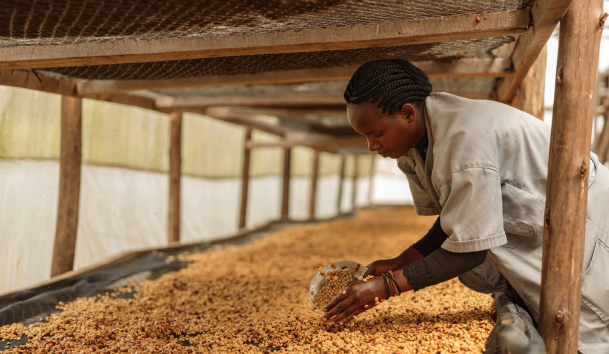At this year’s Africa Food Systems Forum, in line with the Comprehensive Africa Agriculture Development Programme (CAADP) Kampala Agenda, leaders reiterated their commitment to advancing sovereign, resilient and inclusive food systems. Despite this momentum, unmet financing gaps remain one of the most significant obstacles to accelerated agrifood system transformation.
Over the last two decades, African governments nearly doubled annual investments in agriculture; however, these investments fell short of the 10 per cent public investment in agriculture target set under CAADP. More concerning, annual investments have stagnated in recent years. As a result, adequate financing remains out of reach for key drivers of the continent’s agrifood systems—in particular, agrifood SMEs, which account for 80 per cent of domestic agrifood supply chains, operate, in most cases, under severe financial constraints.
There are, however, opportunities to reverse course. From Rwanda to Morocco, countries across the continent are making progress in addressing governance and regulatory challenges, while strengthening institutional capacity to mobilise and manage finance for agrifood transformation, according to the Malabo Montpellier Panel’s MONEYWISE report.
Expanding access to capital financing for small-scale agribusiness through local financial institutions—including banks, pension funds, insurance providers and cooperatives—can drive long-term investment across agrifood systems.
In Rwanda, the Development Bank of Rwanda and the Capital Market Authority were established to spur financial sector development for capital mobilisation, while the Rwanda National Investment Trust (RNIT) promotes a culture of savings through financial literacy campaigns and mobilised savings. The country has also seen a rise in the popularity of Village Savings and Loan Associations (VSLAs) among smallholder farmers, which have improved financial inclusion and expanded access for rural populations.
Furthermore, investing in research on innovative funding mechanisms can allow governments to identify effective pathways to expand access to financial capital for farmers and agrifood firms.
In Morocco, the government, through the Fonds de Développement Agricole (FDA), is leveraging public resources to crowd in private investment and drive transformation across agrifood systems. The FDA encourages private actors to participate in long-term agricultural development by subsidising private investment in land restoration, irrigation systems and agro-processing. Between 2008 and 2020, the country mobilised and deployed US$2.3 billion in public funding, which catalysed over US$7.1 billion in private investment.
Leveraging digital and data tools to bridge access to formal banking can address infrastructure gaps, regulatory barriers and financial exclusion, thereby facilitating the scalability of agricultural financing and service delivery.
Malawi’s e-voucher system under its Affordable Inputs Programme digitises farmer registration to improve targeting and reduce inefficiencies in input distribution and voucher redemption, marking a significant shift toward technology-enabled delivery of price subsidies for agricultural inputs. In Ghana and Nigeria, the Incentive-based Risk-Sharing Schemes for Agricultural Lending—GIRSAL and NIRSAL—aim to expand lending to the agrifood sector by issuing credit guarantees. Operating through pillars such as credit guarantee schemes, bank rating systems, knowledge portals and technical assistance, GIRSAL and NIRSAL are leveraging blended finance instruments to make the sector attractive to lenders, thereby facilitating agricultural financing for farmers and agribusinesses.
Ultimately, agrifood financing works best when aligned with rural development. An integrated approach that links agrifood financing with wider rural development needs can strengthen the impact of investments.
This is demonstrated in Malawi, where the National Economic Empowerment Fund (NEEF) was established to provide affordable and sustainable financial services to economically empower marginalised populations, particularly women, youth and persons with disabilities. This access to capital supports smallholder farmers to transition from subsistence to commercial farming, thus supporting rural economic development and agricultural commercialisation.
Growing evidence demonstrates that supportive policy environments and targeted investments, combined with increased awareness and knowledge of innovative funding mechanisms, and strengthened institutional and technical capacity, can drive successful agrifood systems transformation in Africa. The Malabo Montpellier Panel’s report highlights what is possible when coordinated policies, institutional innovation and targeted investment converge. It is now crucial for governments to move beyond high-level commitments and accelerate the implementation of concrete and scalable actions.






